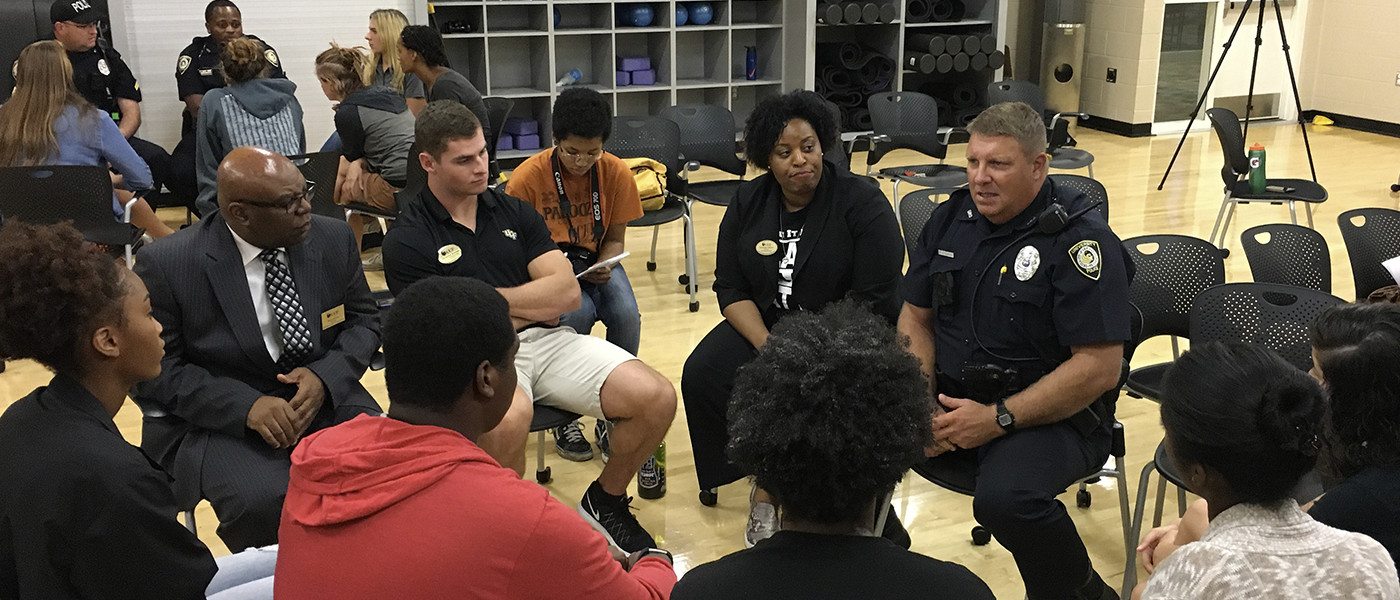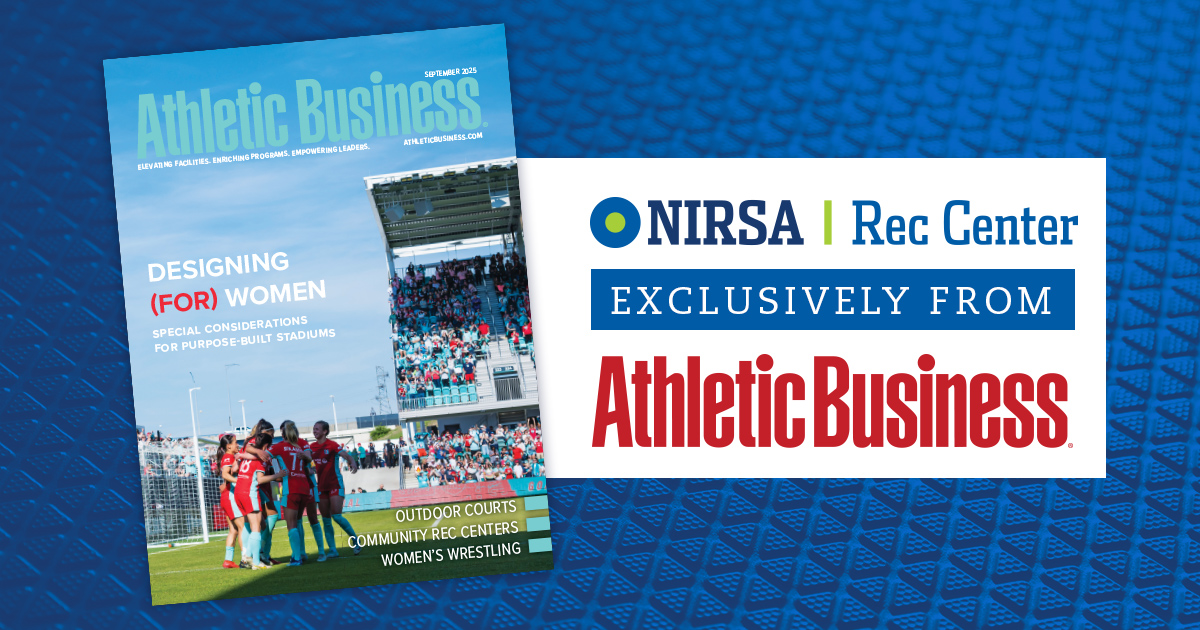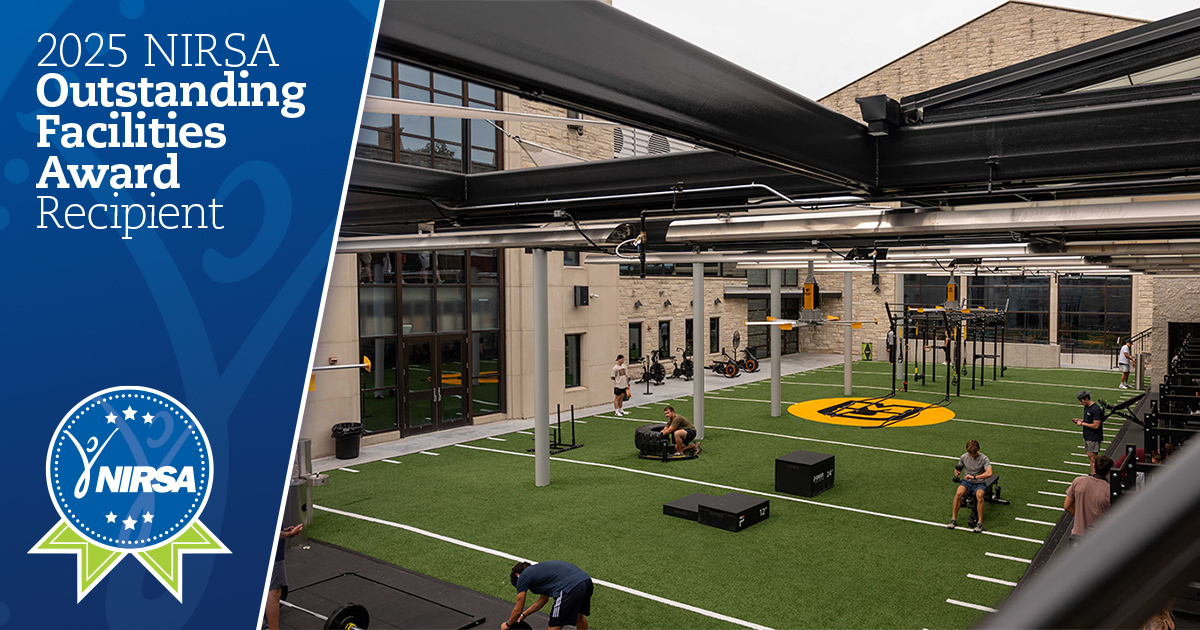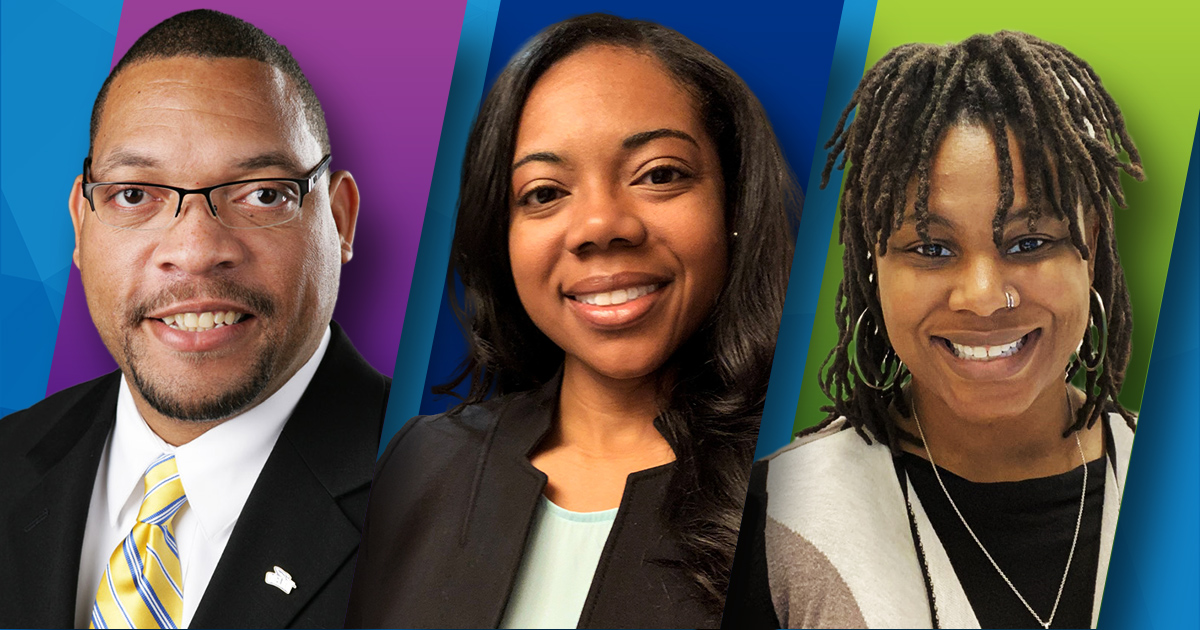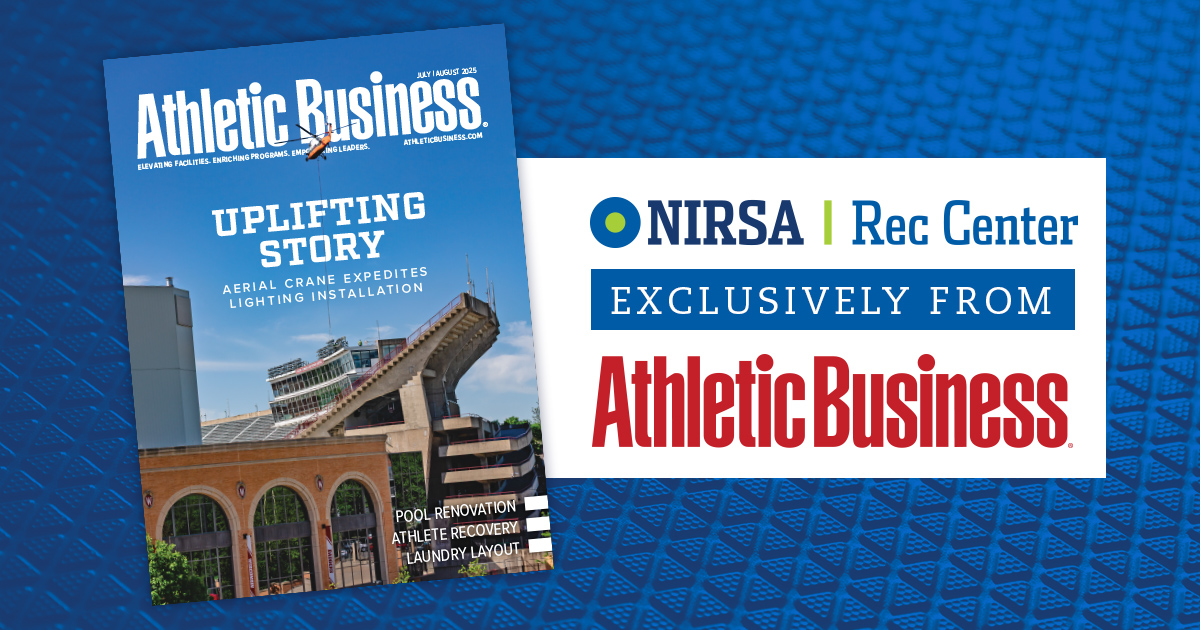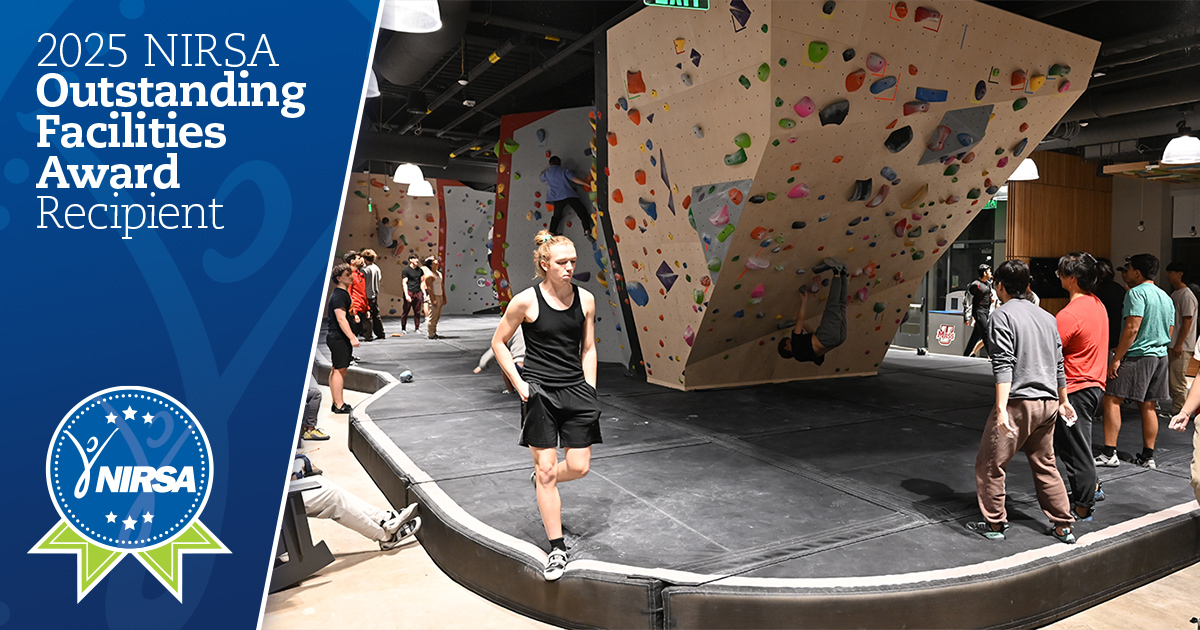As the 2016-2017 school year began, tensions across the United States were high, and the atmosphere on our campus was no exception. The University of Central Florida (UCF) was still mourning after the attack at Pulse Nightclub in June directly affected our community. And yet, as the summer progressed, there had been even more instances of horrific violence. Black Lives Matter, Blue Lives Matter, All Lives Matter dominated the news and our social media feeds.
When the climate of the country is tense, it can often be tempting to see the rec center as an escape. However, our students cannot check their real world concerns at the door. As campus recreation professionals, we have been put in a unique position where countless students walk through our doors daily—some we even put on the front lines to serve the others—and we can make the conscious choice to affect their lives with not just our traditional programs, but those also perceived as non-traditional.
As school began, our staff overheard countless conversations from students expressing fear, anger, and confusion—feelings intensified by often hearing only one side of the conversation. Students were asking if this violence could happen to them, happen on our campus. It became clear that people needed a space to come together, as well as a facilitator to help achieve real dialogue.
So UCF’s Recreation and Wellness Center (RWC) took action to provide just that. On September 26, we partnered with our Social Justice and Advocacy (SJA) Department and the University of Central Florida Police Department (UCFPD) to host the campus’ first community policing discussion.
Use what you already have
While hosting such an event was a new venture for the RWC, the structures and relationships leveraged to make it happen were all pre-existing; addressing issues of diversity and inclusion in your rec center does not have to mean reinventing the wheel. We hosted this discussion as a part of our Knights Leadership Series (KLS), which offers development for our student staff in everything from résumé building to nutritional knowledge. Providing students with a chance to develop their skills in civil discourse—as well as to learn about the realities of race, diversity, and policing in today’s America—certainly fit within the goals and purpose of our KLS.
Our department is lucky to have the strong leadership of and an ally in our Executive Director, Jim Wilkening, who also serves as Co-Chair of NIRSA’s Commission for Equity, Diversity, and Inclusion. Thanks to his directive, since 2009 we have had a campus recreation diversity committee; as the current chair, I am tasked with not just making our students and staff aware of diverse and inclusive events happening on campus, but also creating leadership sessions for KLS.
Jim and I recognized that this event, and its importance, was bigger than the two of us, or even our entire department—so we turned to our campus partners. Jim connected me with a student director from SJA, who was eager to be involved. I also solicited help from the SJA Director and two Deputy Chiefs of Police from UCFPD. RWC, which serves a student population of over 60,000, works with UCFPD whenever we host large-scale events.
UCFPD had already indicated their willingness to support students; they reached out to SJA after the Pulse shootings and they attended the campus vigils. The RWC, SJA, and UCFPD aren’t your traditional cross-campus collaboration, but it was clear from the first planning meeting that all three were fully committed to helping the UCF community.
Intentional planning
While KLS is normally two sessions offered for staff only, we decided to open this opportunity up to the larger campus community. We created two events—one in late morning for our staff and one in the evening, open to all. Both sessions would begin with small groups of participants sitting down with police officers. This would provide the community with a chance to meet face-to-face and discuss concerns of community policing, how to process the shootings happening around the country, and how students of color on our campus and UCFPD could work toward building stronger relationships.
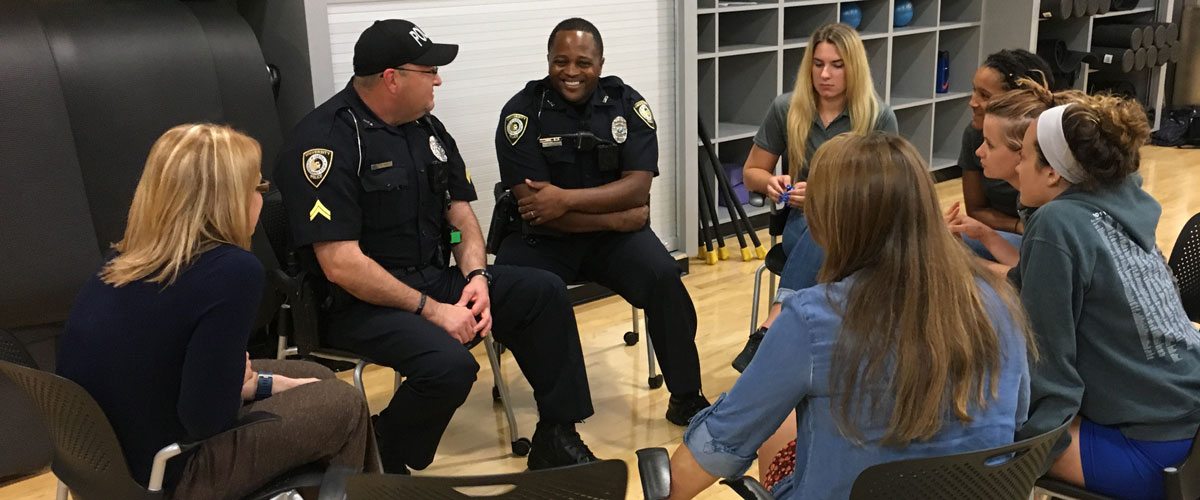
These conversations would be followed by a panel discussion featuring two deputy chiefs, two UCF students, the Director of SJA, and the Executive Director of the Recreation and Wellness Center. I would serve as facilitator.
We did our best to spread the word through multiple channels: students used word of mouth, UCFPD promoted the event on their social media channels, SJA and RWC put up flyers created by our marketing staff. While we knew the morning staff event would be relatively small, we were unsure what kind of turnout to expect for our evening event. While we wanted to create the space for participants to share, we also made plans for the possibility that we may need to turn folks away.
The morning session
On the day of the event, I was a bit nervous but also encouraged by knowing we were coming together with the same goal in mind. Before the morning staff session, I remember watching the faces of students working out at the rec center as the ten uniformed officers entered the building. I am sure the last thing they thought was these officers were at the rec center for a healthy conversation with students.
That morning, 25 RWC employees asked thought provoking questions of the officers and the panel. They were all engaged as one of the deputy chiefs spoke about the tragedies around the country and what they were doing as a department to help prevent them from happening on our campus. It ended in the hour time allotted and everyone involved was pleased that conversations remained respectful.
Why rec?
While this discussion was clearly beneficial for the student employees, the event was perhaps even more beneficial for the RWC professional staff. Students seemed to intuitively understand why we would have this event in our rec center; their understanding, and embracing of the event, was perhaps the best take-away for our staff.
Indeed, part of the reason Jim was on the panel was to address the ‘elephant in the room,’ which as facilitator I made sure to make my first question: Why are we having this event at the rec center when it clearly was not about working out or intramurals? Jim did a great job of letting the group know that the students who were concerned and fearful were our students—they were on our staff; they were in our facility. Why would we not have this conversation? He also talked about how we state diversity and inclusion as one of our department goals, and this was us activating that rhetoric. We want everyone to feel included at the rec center—including students of color, including police.
The evening session
The evening session grew to fifty participants and consisted of engaging and incredible dialogue between the officers and students and staff in attendance. While walking around each group, it was inspiring to hear the positivity and honesty emanating from the students and officers alike. There was both raw emotion and honest debate; as facilitator it was important for me to allow each person to be heard because we wanted anyone who had been feeling silenced to know that between our walls they had an audience.
Perhaps the most impactful moment for me was hearing a student talking about his experience of a traffic stop gone wrong. He was filled with sadness, anger, and fear as he recounted his story with honest and unabated emotion. It was a powerful moment, made even more so when immediately afterwards a deputy chief officer offered a heartfelt apology for this other officer’s actions.
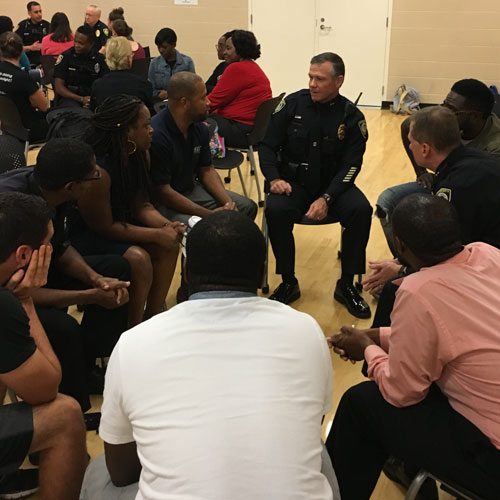
I knew that moment was emblematic of why we wanted to put on this event and address these concerns in our campus recreation department. We can program sports, train students to meet their personal fitness goals, take them on trips every day of the week, and provide these services at a level that exceeds their expectations. Those things are expected from our profession. However, as NIRSA members, we are committed to doing more. We are committed to living our values.
And—as everyone in the room that night witnessed—to offer an environment where students, staff, and faculty can interact with people on the other side of the tension and humanize them, was priceless.
After the evening session’s allotted hour was over, everyone asked to continue. After two hours, the event formally concluded but informally lasted for another hour and a half as people continued sharing stories, asking questions, and learning about each other’s points of view. It might have lasted even longer if it hadn’t come time to close the building!
Continuing the conversation
UCFPD offered their support and provided avenues to continue these conversations through their “Breakfast with a Cop” series. They also invited everyone to their event on implicit bias taking place the following week. Often with events like this we concentrate so much on the singular occasion in front of us we don’t consider the next steps for how we can keep moving forward. UCFPD offered the perfect opportunities to make sure we had those concrete next steps in place.
This event also reiterated how much campus partners can help; we weren’t aware of these programs until we met with UCFPD to begin planning our event. Keep reaching out—you never know what great work is already happening on campus that can aid your initiatives!
As a commissioner for Equity, Diversity and Inclusion through NIRSA, I know we hope our NIRSA colleagues understand how things that are happening in the world, in our country, and on our campuses affect the students that walk through our doors daily. We hope they know that for those students creating a brave space to be heard, to connect with others, and to be themselves is critical.
We hope they know that doing nothing speaks loudly. We hope they know that worrying about getting it ‘right’ or being ‘enough’ is normal, but it shouldn’t stop them from acting—being enough to even one student is a difference worth making. Here at UCF, intramural programs can impact thousands of students while this event impacted just 75. However, for those 75, the results were immeasurable.
- For more information, contact Executive Communications, Advocacy, and External Affairs at NIRSA, Erin O’Sullivan or another member of NIRSA’s Commission for Equity, Diversity, and Inclusion.
- If you are interested in highlighting a program from your campus’s or a NIRSA member’s achievements on your campus, pitch us your ideas.
Andrea Snead, M.A. currently serves as the Director of Diversity and Inclusion for the United States Tennis Association (USTA). She is working on a Doctor of Philosophy (Ph.D.) degree in Sociology at the University of Central Florida. Andrea can be reached at Andrea.Snead@usta.com.


